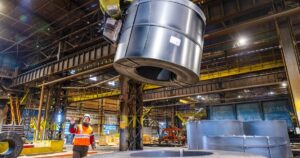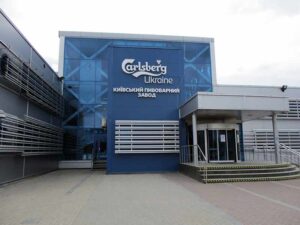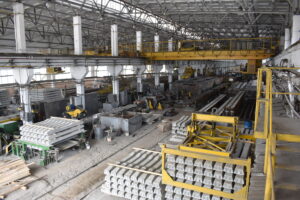
Zaporizhstal Iron and Steel Works has begun supplying rolled steel to Metinvest’s pipe plant in Romania, Metinvest Tubular Iasi, which became part of the group at the end of 2025.
According to a press release on Thursday, since the beginning of 2026, the company has shipped 22,000 tons of hot-rolled structural steel certified to the European standard EN 10025. In total, up to 180,000 tons of rolled steel are planned to be supplied to the pipe plant this year.
“Zaporizhstal’s rolled products are in demand among European and Ukrainian pipe manufacturers: every year, up to 80% of our metal products are shipped for the manufacture of straight-seam pipes and profiles. We are pleased to welcome Romanian pipe manufacturers to the Metinvest Group and to establish a new format of cooperation to strengthen the economic partnership between Ukraine and Europe,” said Taras Shevchenko, acting CEO of Zaporizhstal, whose words are quoted in the report.
It is specified that hot-rolled products made of mild structural steels are in high demand in the pipe industry due to their mechanical properties, which ensure the reliability and strength of finished products. Such products can withstand significant loads, including impact loads, operate under pressure, weld well, and maintain stable performance characteristics.
“Zaporizhstal’s rolled products are used to manufacture round, profile, and rectangular welded pipes that comply with European standards EN 10219 and EN 10217 and are used in geothermal engineering, energy, construction, and fire extinguishing systems, among others. Zaporizhstal steel pipes have proven to fully meet high requirements during testing, so we are establishing long-term mutually beneficial cooperation with Zaporizhstal metallurgists,” said Cosmin Toma, CEO of Metinvest Tubular Iasi, as quoted by the company’s press service.
The largest consumers of pipes produced by Metinvest Tubular Yassy are the domestic market of Romania, as well as companies from Hungary, the Czech Republic, Poland, Slovakia, and other European countries.
As reported, Zaporizhstal produced 3.5 million tons of pig iron, 3.2 million tons of steel, and 2.8 million tons of rolled products in 2025.
Zaporizhstal is a joint venture of the Metinvest Group, whose main shareholders are System Capital Management (71.24%) and Smart Steel Limited (23.76%). Metinvest Holding LLC is the managing company of the Metinvest Group.
METINVEST, PLANT, ROLLED PRODUCTS, ROMANIA, SUPPLY, ZAPORIZHSTAL

Carlsberg Ukraine’s Kyiv plant has installed 1.5 MW diesel generator and cogeneration units (DGU, CGU) to ensure a stable power supply and plans to install a 500 kW solar power plant and a 5 MW power storage facility with a capacity of 10 MWh by the end of the year, according to Roman Sapiga, head of the plant’s automation and electrical engineering group.
“Our enterprise must operate without interruption, so the uninterrupted operation of our power generation facilities is extremely important to us. We chose a 1.5 MW diesel generator and a 1.5 MW gas generator… They work together in an ‘island’ mode and are connected to each other,” he said at the EnergoTech-2026 conference, which took place recently in Kyiv.
Sapiga noted that generation is controlled by a special program, which is constantly being improved.
“Sitting at our workstations, we can see almost all elements of the generation system and can start them up. It is necessary to manage them correctly. Every time we encountered a problem, a new automatic solution appeared,” shared the representative of Carlsberg Ukraine.
According to him, the company also imports electricity, and the management program allows it to track consumption so as not to exceed the limits at which the consumer is not disconnected according to hourly schedules (for this, it must import 60% of its consumption – EP).
“There is a program that tracks the price of electricity for the next day and decides whether to start the CHP and at what time, comparing the market price of electricity with the cost of its production from gas. It worked very well in the summer and early autumn, but with mass blackouts, it doesn’t work,” Sapiga noted.
The Carlsberg Ukraine plant in Kyiv plans to diversify its electricity sources by 2026.
“We are planning a 500 kW solar power plant. We want an energy storage facility (ESF) with a capacity of 5 MW and 10 MWh. We are a large producer. 3 MW of CHP and DG do not even cover half of our consumption,” Sapiga said in a comment to ENERGOREFORM.
As he noted, they plan to look for an investor with whom they can conclude direct contracts for electricity before building the solar power plant.
In addition, Sapiga emphasized that the main reason for developing their own energy supply is not the price of electricity, but the instability of the grid, since under such conditions the plant cannot operate normally.
He named some of the main challenges for 2025 as almost 60 hours of operation on its own generation in the event of a complete grid shutdown, constant software changes, and a reduction in the duration of the transition of generating units to “island” mode from 1.5 hours to 15 minutes.
“My advice is to diversify generation and have a management system that takes into account all available sources, as well as choosing reliable contractors with a good track record. This is especially important for enterprises and businesses,” Sapiga concluded.
Carlsberg Ukraine is part of the Carlsberg Group, one of the world’s leading brewery groups with a large portfolio of beer and other beverage brands. Carlsberg Ukraine includes factories in Zaporizhia, Kyiv, and Lviv. Carlsberg’s portfolio in Ukraine includes beer, alcoholic and non-alcoholic beverages of such brands as Lvivske, Robert Doms, Baltika, Carlsberg, Tuborg, Kronenbourg 1664, Arsenal, Kvas Taras, Somersby, and others.
According to data from Opendatabot, Carlsberg Ukraine increased its revenue by 15.5% to UAH 12.488 billion in 2024, its net profit by 19.4% to UAH 2.18 billion, debt obligations by 34.9% to UAH 5.11 billion, and assets by 33.1% to UAH 13.84 billion. The company currently employs 1,310 people.

The Korosten Reinforced Concrete Sleeper Plant (ZBSH Plant, Zhytomyr Region), which is part of Ukrzaliznytsia, increased its net profit by 7.4 times in 2025 compared to 2024, to UAH 47.1 million.
According to the company’s financial statements in the information disclosure system of the National Securities and Stock Market Commission (NSSMC), net income for the past year increased by 11.8% to UAH 478.2 million.
The plant received UAH 93.7 million in gross profit (3.9 times more), and operating profit increased 7.4 times to UAH 59.9 million.
At the same time, the report notes that in the fourth quarter of 2025, the company received net sales revenue of UAH 167.47 million, which is UAH 104.77 million (2.7 times) more than planned, but UAH 8.75 million (-5%) less than in the same period of 2024, due to a decrease in orders for reinforced concrete products.
Korosten ZBS specializes in the production of reinforced concrete sleepers, switch beams, and mobile modular shelters.
Production capacity utilization is 95% dependent on orders from Ukrzaliznytsia.
At the beginning of 2026, the plant had 363 employees, with an average monthly salary of UAH 34,900.
In 2024, the company produced 269,810 sleepers and 80 sets of switch beams. Its net income decreased by 10% compared to the previous year, to UAH 427.8 million, while net profit increased 4.6 times, to UAH 6.3 million.

PJSC Dnipropetrovsk Food Concentrates Plant (Dnipro, EDRPOU code 00374048) will hold its annual general meeting of shareholders on February 24, 2026, in the form of a remote poll, according to the issuer’s announcement. According to the announcement, the date for compiling the list of shareholders entitled to participate in the meeting is set for February 19, 2026.
The agenda includes, in particular, consideration of the reports of the management board and supervisory board for 2025, approval of the annual report and results of financial and economic activities for 2025 with a decision on the distribution of profits, termination of powers and election of management and control bodies, as well as preliminary consent to significant transactions.
Ballots for voting must be made freely available to shareholders on February 13, 2026, with the period for sending ballots to the depositary institution set from 11:00 a.m. on February 13 to 6:00 p.m. on February 24, 2026.
PJSC Dnipropetrovsk Food Concentrates Plant is registered in Dnipro, with a charter capital of UAH 8.4188 million. According to Opendatabot, the company’s director is Oleksandr Kovrov, and the ultimate beneficiary is Iryna Kovrova; among the shareholders with large stakes are Oleksandr Kovrov (78.5908%) and Iryna Kovrova (19.789%). According to the company, the plant produces, among other things, dry breakfasts, snacks, and coffee products.

In 2025, Kametstal Plant, part of Metinvest Mining and Metallurgical Group (Kamensk, Dnipropetrovsk region), carried out a series of important equipment repairs and expanded its product range by seven items.
According to the company, in 2025, despite the obstacles posed by the war, the company continued to operate, develop and support the economic strength of the region and Ukraine.
Thus, despite logistical difficulties and energy instability, Kametstal implemented the most ambitious capital repair programme of the war years, the most important of which were the overhaul of blast furnace No. 9, a complex of overhauls of the main equipment of both converters, the installation of furnace ladle No. 1, MBLZ-1, and major repairs of the section rolling and pipe mill.
It is noted that Kametstal expanded its product range by seven items and once again became the leader among Metinvest’s enterprises. The plant was the first among the group’s enterprises to commission a gas piston power plant to generate its own electricity. This made it possible to increase the energy security of the main production equipment during wartime.
In the converter shop, continuous casting machine (CCM) No. 1 was reconstructed: important electrical equipment, automated control systems, and key equipment of the machine’s drawing and straightening devices were upgraded in two stages. The electrical equipment of CCM No. 2 was also modernised.
In addition, the construction of new above-ground high- and medium-pressure water pipes to support the technological processes of the converter and lime-burning shops in particular was completed and put into operation.
In 2025, the company invested almost UAH 43 million in improving working conditions at the enterprise.
Kametstal is part of the Metinvest Group.

The ElectronMash plant (Lviv), which is part of the Electron corporation, and the Rivne NPP branch of the Energoatom National Nuclear Energy Company have signed a contract for the supply of five new large city buses for an estimated UAH 75.375 million (excluding VAT).
According to information in Prozorro, the agreement was signed on December 24 after ElectronMash was declared the winner of the relevant tender, in which it was the only participant.
According to the contract, with a total value of UAH 90.45 million (including VAT), the buses will be delivered within 245 calendar days from the date of receipt of the advance payment. A 30% advance payment (UAH 27.135 million) is provided for within 30 calendar days from the date of signing.
As reported, ElectronMash offered 12-meter low-floor Electron A18501 buses at a price of UAH 15.075 million (excluding VAT) each.
The buses were manufactured this year. They are equipped with a Cummins diesel engine that meets the Euro 6 environmental standard, a ZF automatic transmission, and an EBS system. Each bus is designed to carry more than 100 passengers (at least 30 seated), equipped with a folding ramp and seat belts in the passenger compartment to secure wheelchairs.
The Electron A18501 buses were first introduced by the manufacturer in 2016 and are currently in operation in Lviv and Uzhhorod.
The Rivne Nuclear Power Plant announced a tender for the purchase of five large buses on October 17 this year, with a delivery date of November 30, 2026. The auction was scheduled for October 28, but the customer postponed the deadline for submitting bids and its date several times.
As reported, the large Ukrainian bus manufacturer Etalon Corporation considered the tender conditions to be discriminatory, as they were written for the Turkish Temsa LF 12 bus, and also noted that for the announced price, it could offer seven Etalon buses instead of five. However, the customer did not change the tender conditions proposed by Etalon.
ElektronMash Plant LLC, in which Concern-Elektron JSC owns a 55% stake, specializes in the design and manufacture of trams, trolleybuses, electric buses, and city passenger buses, as well as aggregates and spare parts.
In 2024, the plant increased its net income by 87.7% compared to the previous year, to UAH 244 million, with a net profit of UAH 0.06 million, compared to UAH 0.9 million in 2023.